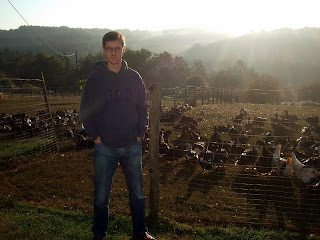A short while ago, Councillors were written to requesting that they "ban Foie gras from council property, and further to discourage the sale of Foie Gras in Cambridge." - the campaign group behind this call seems to have stepped up a gear, and a petition will be discussed at strategy and resources committee later today.
I suspect the authors of this request have a slightly fanciful impression of the catering arrangements at the Guildhall (we tend to prefer champagne and caviar for sustenance when making really important decisions), but for such a controversial subject a fact finding mission seemed in order. So the week before last, I had an early morning trip to a foie gras farm in the Dordogne region of France.

Like most foie gras farms, this one farms ducks rather than geese - the latter being more aggressive, as well as requiring more handling. The farm receives ducklings aged 1 day old, that live in a barn until they are old enough to go outside. At this point, the female ducks are separated out and are used for roast duck - they are apparantly noisier and don't grow as much!

Whilst outside, they roam in large fields - and conditions seem much better, than for example throughout the life of a battery chicken.

After several months of 'normal' (if somewhat high calorie) lifestyle, the ducks are moved to cages for the most controversial part of the process.
For the final 10 days, they are kept in cages and subjected to 'gavage', the force feeding twice daily of maize mixture, totalling 1kg a day. This causes the liver of the ducks - the prized ingredient of foie gras - to swell up to significantly more than normal size.

After 10 days, the ducks are stunned and killed, and almost all the duck, including feathers is used.
Having seen the whole process, it is hard to draw definitive conclusions as to how cruel it is - the ducks being force fed did not appear to be unduly distressed - the storage of food in the gullet, and the laying down of fat in the liver are also to some extent natural processes.
I am not a vegetarian - and even if meat eaters chose not to think about it very much, this does involve keeping animals that will eventually be killed for human consumption - many of those who object to foie gras are opposed to all animal rearing for human consumption. The question is what harm or distress is being caused, how does this relate to other alarm or distress caused by animal production for human consumption? Objective evidence of this (of a more scientific variety than one trip to a farm is likely to reveal) is hard to come by. It is right that animals kept for food should not be subject to unreasonable distress, however I remain to be convinced that foie gras production is necessarily unacceptable.
It would certainly be outrageous if Council Tax payers money was spent on foie gras (or champagne and caviar for that matter!), but if, for example, a well know chef was to open a restaurant in the Guildhall, should a condition of the lease be that no foie gras is served? (There's no suggestion this is part of Jamie Oliver's plans!)
But I don't think the Council should interfere even if it was, let alone try to influence consumption elsewhere in the city - I think it should be down to activists to peacefully persuade and consumers to make their own decision.

1 comment:
Lucky old you Chris. I see Cllrs Cantrill and Nimmo Smith were in attendance - no doubt talking a load of - well a lot of it passes through Geese every day.
I can't say I like the sound of Foie Gras production methods but ultimately this should be a consumer choice issue - the camapaign group should stick to promoting humane methods - and encourage consumers to exercise a purchasing choice that supports it.
Ban, regulate, license monitor, control, register - yawn.
Whilst on the subject of goose liver something fat and juicy is possibly coming up over the horizon for the S&R committee to get its teeth into. I feel it in my bones.
Remember Chris - Any Member of a S&O Committee may call in any issue relevant to that Committee.
Local Government Act 2000 - Section 21(8)a
Post a Comment